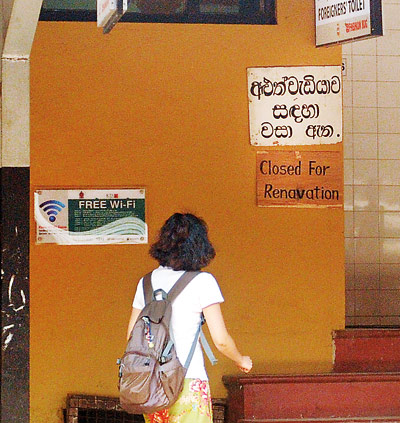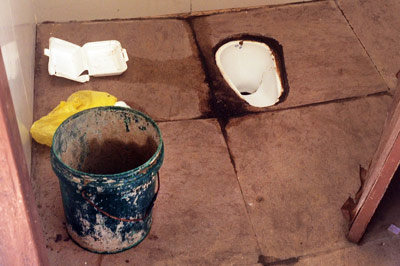News
Discrimination: Locals push for toilet equality at railway stations

Colombo Fort: A foreigner looks up at signboard that says that toilet for foreigners is under renovation. Pix by Amila Gamage
Forty-five-year-old K. Jamis from Nuwara Eliya waits outside a public toilet at the Colombo Fort Railway Station. The foul smell from within could be smelt even from where he stood.
A glance into the small room would be enough to witness the muddy and urine scattered floors and unattractive scribbling on the walls.
A few feet away a separate toilet is under renovation. With clean painted walls, well tiled floors, commodes and bright lighting, it stood out well. However, this was not to be used by the locals. They were specially made and managed for the foreigners.
“People like us use trains all the time. We need better facilities than that is offered but instead the foreigners are treated better,” he said. Because the toilets at railway stations and inside train commodes are in filthy condition. Mr. Jamis does not use them often.
Mariyanathan Devananth, 38, who works at a private hospital, also shares the same view. He said the restrooms and toilets in railway stations are not in usable condition. Sometimes Mr. Devananth and his family members had to stay hours for a train but they try not to use toilet facilities as a result.
“I’m travelling with two relatives and my mother to Batticaloa now.
They are hesitant to use the toilets at the station because toilets for females are not maintained are dimly lighted and have no piped water supply at most times,” he said adding there were instances where men peeped into the toilets as the women used them. He said providing better toilets to foreigners is discriminating to locals.
Making matters worse the specially separated toilets are kept under lock and key cutting off any local from using them, but in turn this has antagonised the foreigners too.
Pleuni Sloots, 27, who is visiting from Holland, said keeping toilets locked is a nuisance and also an embarrassment when they have to get the key from the ticket counter. Ms. Sloots sometimes has to stay for a long time till railway officers open the toilets for them.

Dirty and broken down: A toilet for locals at the Mount Lavinia station
“It is also absurd to see separate toilets for foreigners. In Holland all tourists and the public are treated equally,” she said adding that sanitation is important and all toilets should be well maintained.
According to the Locomotive Operating Engineers Union (LOEU) the toilets at railway stations needs immediate attention. Its secretary K. A. U. Konthesingha said that the public toilets are infested with rats and cockroaches.
He revealed that night mail trains are in worst conditions and at nights groups break into these toilets to drink and sleep. Most times they steal bulbs and taps and cause damage to properties, making cleaning up a nightmare on its own.
There are around 300 railway stations in Sri Lanka with 160 major stations and 145 substations. Maintaining toilets in these places have become a burden to the Railways Department as there is a shortage of minor staff. Now it has been decided to privatise the cleaning department.
“The Government should step in to maintain public toilets at railway stations and deploy security officers to preserve these places,” said the Secretary to the All Ceylon Railway Employees’ General Union, S. P. Vithanage.
He also said that local commuters are also responsible for the situation. “They use toilets in an unhygienic way and leave them in appalling conditions after they use them. We can tackle this problem by deploying officers.”
However, he revealed that Sri Lanka Railway Administration has no power to recruit cleaners and security staff due to political issues and lack of funds.
“But we cannot continue to use public toilets this way. Regular commuters should be given better facilities. Laws and regulations should be in place and maintenance should be accelerated, while facilities are provided to locals and foreigners equally,” he said.
Meanwhile, Railways Department General Manager B. A. P. Ariyaratne, admitted that the departments’ step to build separate toilets have created issues among the public. He said cleanliness of toilets is hard to maintain.
The railways are losing Rs. 600 billion after the reduction of five per cent taxes from school children and 15 per cent of the fare of the office crowd, who generally use a season.
“In order to preserve the image of the country we have built separate toilets to foreigners. We are now planning to build more toilets and make them available to the public,” he said.
“I admit we are wrong, it is fair for the local commuter to feel neglected, debunked, separated and imperiled by our actions. Therefore the local people toilets will be improved while foreigner’s toilets will be renamed as upper according to ticket class.”
Addressing the issue the Deputy Minister of Transport and Civil Aviation Ashoka Abeysinghe said, “We always try to keep these public facilities clean but as the public keep damaging them they are hard to be maintained and education of sanitation among the public is not there.”
He added that though the ministry has invested a lot on maintenance the situation is hard to tackle as a result. “People complain about the separate facilities given to foreigners but they should also remember that public toilets are also improved but within a short period they are badly used.”
The deputy minister added that when foreigners toilets are renovated that stays the same way for a long time.
“We are still using the railways that were constructed by the foreigners and I do not see an issue in providing them with better facilities,” he said promising to look into the issue in near future but that railways are running at a loss of Rs. 15.0 million annually.
| ‘Lankans don’t know toilet manners’ Locals do not use toilets properly while foreigners maintain theirs well prompting authorities to have separate toilets for the two groups, Station Master attached to the Ella Railway Station said. He said the public toilet for locals is always muddy, with betel spit all over the place and are most often vandalised. “We clean the toilets after each train leaves but those who clean complain that the people do not care to keep the place well maintained,” he said. An employee at the Galle railway station said that sanitation facilities provided to the public are very poor. Most walls, he said, have cracks and roofs are leaking. He said there are plans to build a separate toilet for foreigners because the existing one is not in a good condition. |

